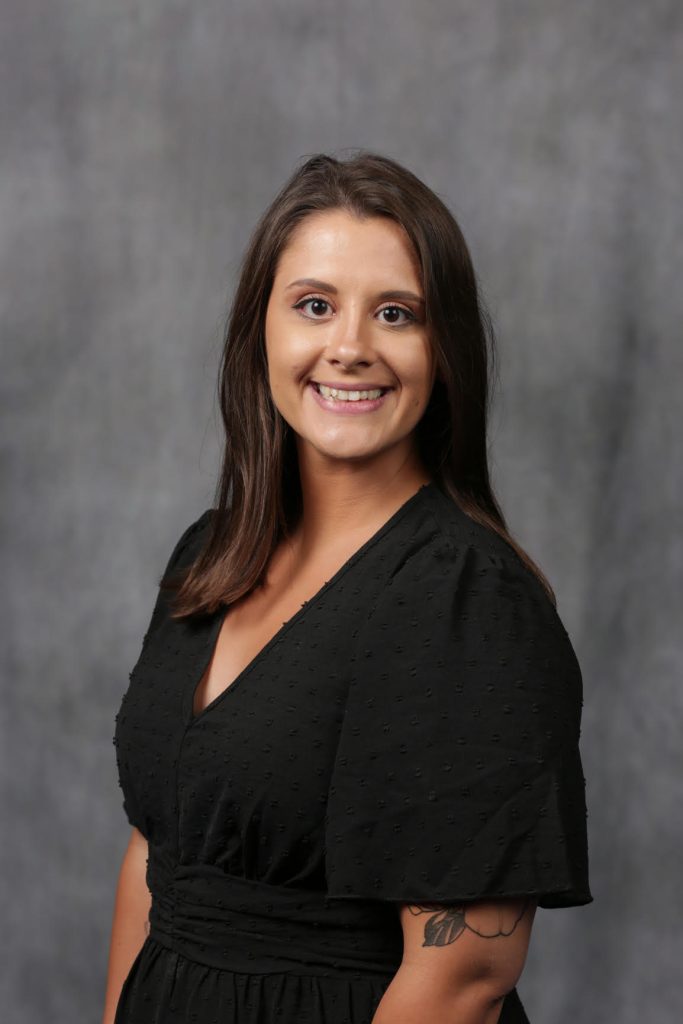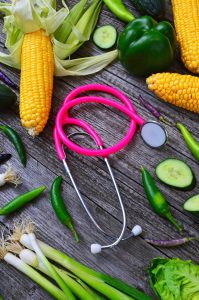
PhD Student at UMaine
Spotlight on Food & Nutrition Research – Featuring UMaine Graduate Students
The WellNurse Master Chef Workshop — Kayla Parson, PhD Student
What is the topic of your research, and why did you choose to pursue this area?
I aim to develop and test the feasibility of a college-based culinary workshop which incorporates nutrition education, mindful eating, and body appreciation. My research is a part of the UMaine’s School of Nursing’s WellNurse Interdisciplinary project. The WellNurse project is a longitudinal study which aims to reduce burnout and improve resilience among UMaine’s nursing community. The WellNurse project has developed and adopted several interventions for participants that promote mindfulness training, physical activity, peer tutoring and healthful eating habits. For a quick glimpse of the entire project, check out this video!
Prior to starting my PhD, I was naturally drawn towards the concept of intuitive eating. Once I gained the opportunity to collaborate with the WellNurse team, in addition to completing a mindfulness-based stress reduction course, and now, in the midst of completing a mindful eating teacher certification course; this interest has further evolved into the very similar concept of mindful eating. Mindful eating is the practice of non-judgmental awareness of all internal and external experiences during the act of eating. I’m a proponent of mindful eating because it’s rooted in non-judgement and self-compassion, and it’s an accessible practice that has been shown to improve maladaptive eating behaviors.
Would you give a brief summary of your research, including some background information, methods, major findings or future research plans?
College students face unique obstacles in adopting a healthy lifestyle. An intervention that addresses multiple college-specific barriers (e.g. cooking knowledge, eating on a budget, social influence, time restraints) is important in trying to build students’ self-efficacy for healthy eating in their environment. Promotion of mindful eating, and general mindfulness practice, may be advantageous for the college population because students have been found to have maladaptive coping mechanisms, often contributing to poor dietary habits. Cultivating nutrition knowledge and the use of positive stress-reduction strategies can benefit those in high stress situations. College students are also more likely to engage and learn if education incorporates gaming elements; this prompted the idea of developing a cooking competition amongst participants, in which they are given a basic outline of a healthful, cost-effective recipe, and each group can then customize their recipe with additional ingredients. All participants then “rate” each other’s recipes through the practice of mindful eating, with an emphasis on using all senses to evaluate their new creations.
Under the guidance of Dr. McNamara, these ideas were the basis for the development of the Master Chef: Nursing Edition program. The Master Chef pilot program was disseminated in Fall 2022. Participants were recruited from the larger WellNurse study. In this randomized control trial, the control was recruited from WellNurse through matched-based design, paying specific attention to gender, grade level, and ethnicity. The pilot program was held monthly for four months, with baseline information being collected from workshop registration (prior to the first class), and post data was collected at the end of the last workshop. Each workshop was about 90 minutes in length, with the basic lesson outline including a mindful eating or mindfulness topic, nutrition education, a cooking competition, and discussion at the end. Participants were also provided with a take-home bag after each lesson, which contained the recipe and key ingredients from the lesson. Some of the key variables measured at both baseline and follow-up included mindful eating, body appreciation, diet quality and fruit and vegetable intake. Presumably due to low participation (n=6), no quantitative results from the pilot were statistically significant. Interestingly, we did see an upward trend of diet quality, mindful eating skills, and fruit and vegetable intake in the experimental group (n=3). These improvements were not found in the control group (n=3).
 During the spring, the feasibility of the pilot was tested qualitatively through the use of a focus group. Participants were invited to discuss the pilot, which was then transcribed and coded by three independent researchers. Themes were generated using inductive thematic analysis. Major themes that arose in the focus group included (1) learning opportunities, (2) collaboration, (3) course feedback, and (4) self-described course outcomes. To further inform pilot modifications, an expert review of the curriculum will be conducted. Expert reviewers will be recruited from The Center of Mindful Eating to complete an online survey assessing the curriculum. Much like the participant focus groups, answers will undergo thematic analysis. With adjustments from overarching themes found both in the focus group and expert review, the Master Chef program will be implemented again in Fall 2023 and Spring 2024.
During the spring, the feasibility of the pilot was tested qualitatively through the use of a focus group. Participants were invited to discuss the pilot, which was then transcribed and coded by three independent researchers. Themes were generated using inductive thematic analysis. Major themes that arose in the focus group included (1) learning opportunities, (2) collaboration, (3) course feedback, and (4) self-described course outcomes. To further inform pilot modifications, an expert review of the curriculum will be conducted. Expert reviewers will be recruited from The Center of Mindful Eating to complete an online survey assessing the curriculum. Much like the participant focus groups, answers will undergo thematic analysis. With adjustments from overarching themes found both in the focus group and expert review, the Master Chef program will be implemented again in Fall 2023 and Spring 2024.
Interestingly, the curriculum will be delivered in two different formats between the semesters. During Fall 2023, participants will attend the workshop daily for an hour and a half for a week, and then receive mindful eating “booster” assignments throughout the rest of the semester. Health surveys will be distributed prior to the intervention, directly after the week-long workshop, and at the end of the semester. In contrast, during the Spring 2024 semester, workshops will be held monthly with no additional take-home assignments. This contrast will be useful in evaluating dosage effects. A MANOVA will be used to compare health outcomes between curriculum formats. Multiple linear regressions will be used to identify predictors of diet quality using the combined fall and spring samples.
I look forward to analyzing the quantitative results in-between workshop implementations, and seeing if this program provides the benefits that it intends!
What are some limitations and implications for your research?
As with any study, my dissertation research is not without limitations. Participants of the WellNurse study are provided the opportunity to sign up for the workshops. This could contribute to selection bias, and alter data results. It’s also important to note that a majority of participants have been white, and female thus far. This presents limitations in understanding if this program is effective amongst more diverse populations.
Based on your findings and a review of the current literature, what advice or recommendations would you give to the general public?
As of now, I have two major pieces of advice.
Too often, many of us are distracted during day-to-day activities. This can interfere with our eating behaviors, and we forget how to truly enjoy a meal. Practicing mindful eating can make your meal more enjoyable through increased awareness. Mindful eating can look like removing electronics and other distractions from the table, focusing on our senses, and noticing what thoughts cross the mind when eating. The key to mindful eating is non-judgmental awareness. Through this lens, we can identify influences of our eating behaviors with self-compassion, eventually prompting non-reactivity to different stimuli.
From the qualitative results of the pilot study, a major theme amongst participants was collaboration. Several participants reported that they enjoyed working with their peers in creating unique dishes. This coincides with previous research that cooking interventions promote a sense of community, contributing to a more prosperous learning environment. Translating these findings into general advice, I would recommend making cooking a fun, social activity! Cooking can be a fulfilling and creative way to develop healthy delicious recipes, and what better way to do this than enjoying the process with those who support and encourage you.
Have you submitted your research for publication (if so, what journal?), or are you in the process of writing an article for publication?
Recently, the WellNurse team published, “WellNurse: Wellness in Nursing Education to Promote Resilience and Reduce Burnout: A Holistic Multidimensional Wellness Intervention and Longitudinal Research Study Design Protocol” to JMIR Research Protocols, outlining the entirety of the WellNurse project. Currently, I’m preparing a manuscript which aims to assess the relationship between the college food environment and health behaviors, including satisfaction with life, resilience and burnout. My main writing priority is my PhD dissertation, from which I’m hoping to be able to derive three different publications.
Kayla currently holds a bachelor’s and master’s degree in Food Science & Human Nutrition from the University of Maine, and is a licensed and registered dietitian nutritionist. She plans to graduate with her PhD in Food and Nutrition Sciences at the University of Maine in December 2024. Congratulations, Kayla!
